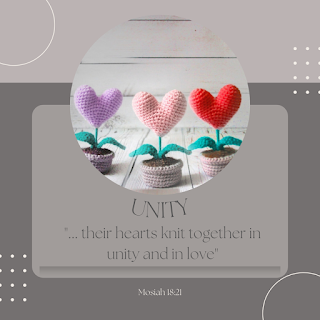Unity
At the heart of just about every general education program is a humanities class. Almost every college student takes one, and it was my turn two years ago. As its name implies, humanities classes help us understand what it is to be human – human intellect, artistic creativity, and the record of human experiences as seen in the arts. It was one of my favorite classes in my educational journey. One of our first lessons was about music – specifically harmony.
A quick review for those who may not have had a music theory class recently: harmony, in short, is playing or singing more than one pitch simultaneously. Groups like Pentatonix, The Nylons, or BYU’s Vocal Point come to mind. When we think of harmony in music, we usually associate it with what is known as consonant harmony – stable and pleasant. There is also a different kind of harmony known as dissonant harmony - when the notes can sound harsh and unpleasant and feel very unstable. Think about the music accompanying the shower scene in the movie Psycho or the movie Jaws. In music, dissonance creates tension that pulls the listener towards resolution, creating forward momentum. The opening bars of Whitney Houston’s I Will Always Love You create tension, emphasized further with a fermata (hold), that finally resolves when the central theme begins.
In my current calling, I have the opportunity to rub shoulders with many women throughout the stake – something for which I am eternally grateful. In the last several months, many of the women I have spoken with have expressed feelings of dissonance. Often this feeling of tension is creating an unsettling sense of uncertainty for them. “If only we could go back to when things were simpler.”
Elder Bruce C. Hafen once said, “… today’s society is filled with increasing dissonance and conflict on a host of political, cultural, and social issues. People on extreme sides of these questions seem very certain about the right answer. But some people would rather be certain than be right."1
Joseph Smith taught there are power and strength in unity. Now, more than ever before, we need this unifying power in our lives to not only weather the pandemic storm but to face the divisiveness and intolerance so prevalent in the world today.
On another occasion, Elder Hafen used a simple analogy to explain how we, as covenant women, should handle the increasing dissonance we see in the world: “For me, the ideal metaphor is a musical one: with our many voices, we could all sing in unison, in harmony, or in dissonance. Of these three, I prefer harmony because it enables a variety of voices to blend into a fuller, richer sound than mere unison."2
I believe the unity Joseph spoke of is the same thing Elder Hafen referred to as harmony – a consonant harmony. Unity is an eternal principle laced throughout scripture. It determines stability and security both in our personal lives and in our community. Recently, President Kevin J. Worthen observed, “Some confusion on this issue comes from the ambiguity of the term unity. True unity does not require us to give up our individuality.”3
Elder Quentin L. Cook echoed this in his conference address last October when he said, “unity and diversity are not opposites. We can achieve greater unity as we foster an atmosphere of inclusion and respect for diversity.”4
Each of us has different gifts and experiences that make us unique individuals. This uniqueness should contribute to greater unity within and can when we value diverse perspectives. Without variety, we are left simply with uniformity, and uniformity does not lead to growth. When we embrace times of dissonance and lean into them, allowing the tension to propel us forward, we become more united and have a greater capacity to reach our potential. The key to achieving this unity amid diversity can only come through Christ.
Recently, the First Presidency and Quorum of the Twelve reminded us of this very thing: “… we remind our members—whatever their individual political views—to be united in our commitment to the Savior Jesus Christ and His teachings. As His followers, we should treat one another and all of God’s children with respect, dignity, and love. No political or other affiliation should supersede that covenant and sacred responsibility.”5
Let me suggest a couple of questions for all of us to ponder:
1. Does my communication with others, both verbally and written, point them to Christ?
2. Would someone looking at my online presence feel my love for the Savior and for others?
Oh, how we need each other! We need the harmony our individuality brings and the unity that comes as we each draw closer to our Savior. The dissonance in the world will continue, and probably at an increasing rate, but we can successfully meet any challenge when we keep our focus on our Savior and the power and strength that comes from unity.
______________________
1 Bruce C. Hafen and Marie K. Hafen, Faith Is Not Blind (Salt Lake City, Utah: Deseret Book, 2018), 17 (Bookshelf Edition).
2 Bruce C. Hafen, "All Those Books, and the Spirit, Too!," BYU Speeches (https://speeches.byu.edu/talks/bruce-c-hafen/books-spirit/ : accessed 11 February 2021), 26 August 1991.
3 Kevin J. Worthen, "Persevere In Unity," BYU Speeches (https://speeches.byu.edu/talks/kevin-j-worthen/unity/ : accessed 11 February 2021), 12 January 2021.
4 Quentin L. Cook, "Hearts Knit in Righteousness and Unity," General Conference, October 2020.
5 The Church of Jesus Christ of Latter-day Saints, "Church Leaders Condemn Violence and Lawless Behavior During Times of Unrest," Newsroom (https://newsroom.churchofjesuschrist.org/article/church-leaders-condemn-violence-and-lawless-behavior-during-times-of-unrest : accessed 11 February 2021), 15 January 2021.




Comments